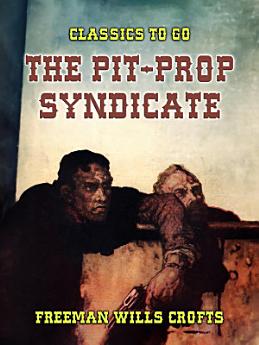The Pit-Prop Syndicate
Sep 2023 · Otbebookpublishing
Ebook
251
Pages
family_home
Eligible
info
reportRatings and reviews aren’t verified Learn More
About this ebook
Following a lorry to find fuel, he discovers that it belongs to an English company making timber pit-props for coal mines back home. His suspicions of illegal activity are aroused when he sees the exact same lorry with a different number plate - and confirmed later with the shocking discovery of a body.
About the author
Freeman Wills Crofts (1879-1957) was a pioneering figure in the Golden Age of Detective Fiction, a period marked by the rise of the classic whodunit. Born in Dublin, Ireland, Crofts initially pursued a career as a railway engineer, a profession that deeply influenced his meticulous approach to plotting and detail in his literary works. His transition from engineering to writing was serendipitous, spurred by a prolonged illness that confined him to bed and provided the time to pen his first novel.Crofts is best known for creating the methodical and unflappable Inspector Joseph French, a character who epitomized the "police procedural" genre long before it became a staple in crime fiction. French's reliance on logical deduction, painstaking investigation, and the use of emerging forensic techniques set a new standard for realism in detective stories. This approach distinguished Crofts from his contemporaries, who often favored more flamboyant and eccentric sleuths.Despite his significant contributions to the genre, Crofts' work was not without controversy. Some critics argued that his emphasis on intricate plotting came at the expense of character development and literary flair. However, his influence on contemporary writers is undeniable; authors such as Agatha Christie and Raymond Chandler acknowledged his impact on their own work.Crofts also championed revolutionary ideas in crime fiction, particularly the importance of alibis and time-tables, which added a layer of complexity and authenticity to his narratives. His engineering background lent a unique precision to his storytelling, making his novels a bridge between the technical and the imaginative.In an era where the detective genre continues to evolve, Freeman Wills Crofts remains a towering figure whose innovative techniques and dedication to realism continue to inspire and challenge writers and readers alike.
Rate this ebook
Tell us what you think.
Reading information
Smartphones and tablets
Install the Google Play Books app for Android and iPad/iPhone. It syncs automatically with your account and allows you to read online or offline wherever you are.
Laptops and computers
You can listen to audiobooks purchased on Google Play using your computer's web browser.
eReaders and other devices
To read on e-ink devices like Kobo eReaders, you'll need to download a file and transfer it to your device. Follow the detailed Help Center instructions to transfer the files to supported eReaders.








